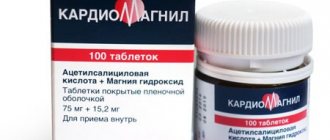Overdose and side effects of loperamide
Loperamide is not recommended for use in cases of ulcerative colitis, bloody or tarry stools, diarrhea caused by antibiotics, or diarrhea that is accompanied by a high fever.
The maximum daily dose of loperamide for an adult is 12 mg.
The drug is available in the following forms:
- pills;
- capsules;
- dispersible tablets.
Be careful!
Loperamide is safe when used as directed and at the recommended dosage. An overdose of loperamide can cause heart problems and cause serious harm to health.
Loperamide cannot be combined with all medications; if combined incorrectly, side effects may occur. Before taking loperamide, consult your doctor.
Overdose
Cases of overdose with any form of the drug are possible. Appears as:
- problems with coordination;
- drowsiness;
- difficulty breathing;
- stupor;
- intestinal obstruction.
Naloxone is considered the antidote of the drug. Since the duration of action of the antidote is shorter than that of Loperamide, repeated administration may be necessary. In addition to Naloxone, other actions must be taken to help suppress the signs of overdose. Such measures include: cleansing the gastrointestinal tract, taking enterosorbents. In some cases, ventilation may be necessary.
Using loperamide: what you need to know before you start taking it
Loperamide should not be taken if you are allergic or hypersensitive to loperamide hydrochloride or any part of the drug.
Loperamide should not be used if you have the following conditions:
- abdominal pain without diarrhea;
- ulcerative colitis or pseudomembranous colitis caused by the use of broad-spectrum antibiotics;
- bacterial enterocolitis caused by microorganisms of the Salmonella, Shigella and Campylobacter families;
- diarrhea accompanied by high fever;
- diarrhea caused by a bacterial infection;
- bloody, black, tarry stools.
Before taking loperamide to treat diarrhea caused by antibiotics, consult your doctor.
This drug should not be taken by children under 2 years of age. For older children, loperamide should be prescribed by a doctor.
Check with your doctor to see if it is safe for you to take loperamide if you have these conditions:
- fever;
- mucus in stool;
- liver diseases;
- heart rhythm disturbances.
It is unknown whether loperamide can harm the fetus during pregnancy. Therefore, pregnant women should inform their doctor about their condition and follow his recommendations for using the drug.
During lactation (breastfeeding), do not take loperamide or stop feeding while using the drug.
Contraindications
In the process of taking the medicine, painful and other conditions were identified that were negatively affected by the medicine. In such conditions, you should immediately stop taking the drug. Before taking Loperamide, you should familiarize yourself with the list of contraindications and make sure that there are no such conditions.
Contraindications include:
- intestinal obstruction;
- individual increased susceptibility to the constituent components;
- acute ulcerative colitis;
- lactation period;
- 1st trimester of pregnancy;
- constipation;
- children under the age of 4-8 years (depending on the manufacturer).
How to take loperamide?
You should take loperamide according to the instructions or individual doctor's prescription.
You should not take a dose of the drug more than recommended in the instructions. Overdose can cause serious heart problems and other negative effects.
Pay attention to the difference in dosages for adults and children. Doses for children of different ages are different, so read the instructions carefully.
Loperamide in tablet and capsule form should be taken with a full glass of water.
Diarrhea causes fluid loss that needs to be replaced, so if you have this condition, you should drink plenty of water to avoid dehydration.
The rules for using loperamide depend on the form of the drug, for example, a chewable tablet must be chewed before swallowing. Loperamide in the form of an oral suspension (liquid) should be shaken before administration and the dose indicated in the instructions should be taken. It must be measured only using a special device for measuring the dose of medicine, which is included with the package, and not with a kitchen spoon.
The drug must be stored at room temperature, avoiding moisture and sunlight. Loperamide in liquid and suspension form should not be frozen.
Be careful!
Stop using the drug and call your doctor if, after 2 days of using loperamide, your diarrhea does not go away or you experience bloating.
#3 Disadvantages of loperamide
People 18 to 60 years of age who are not taking any medications or have other medical conditions are likely to experience the following side effects:
- Constipation (as a consequence of taking more loperamide).
- Dizziness or drowsiness, which may affect your ability to drive or operate machines.
- Bloating, loss of appetite, abdominal pain and skin rash.
The drug may not be suitable for you in the following cases:
- with intestinal obstruction, abdominal pain without diarrhea, blood or mucus with diarrhea;
- with rare hereditary forms of galactose intolerance, Lapp lactase deficiency or glucose-galactose malabsorption syndrome, since the capsules may contain lactose;
- during pregnancy and breastfeeding, except on the advice of a doctor.
Be careful!
In general, older adults and children, people with liver or kidney disease, heart disease, diabetes and seizures, and people taking other medications that interact with ibuprofen are at greater risk of developing a wide range of side effects.
Consequences of an overdose of loperamide
Get emergency medical help if you think you have taken too much loperamide.
Symptoms of overdose are as follows:
- cardiopalmus;
- irregular heartbeat;
- fainting.
Be careful!
If you have these symptoms, call your doctor or seek emergency medical help immediately. If you become unconscious, the person near you should immediately seek emergency medical attention.
Features of the use of loperamide in case of poisoning
Loperamide for diarrhea in case of poisoning is used as symptomatic therapy.
If the cause of diarrhea can be established, appropriate etiotropic treatment should be started2.
It is important to remember that frequent bowel movements are a reason to immediately seek medical help.
If you have additional symptoms (fever, vomiting, the appearance of blood or other atypical impurities in the stool), you should consult a specialist as soon as possible, and you should not take any medications on your own before the examination!
Up to contents
What should you not do while taking loperamide?
Loperamide should not be taken with tonic water; the interaction between the two may cause heart problems.
Stay hydrated and drink plenty of fluids. If you are dehydrated, do not engage in intense exercise or be outside in hot weather.
Study the effect of the drug on you before driving a car or operating complex machinery. The speed of your reactions may be impaired. If the medicine causes drowsiness and slower reactions, do not drive or operate complex machinery after using it.
How does loperamide act in case of poisoning?
Loperamide acts directly in the intestine. The active substance binds to opioid receptors and thereby helps to slow down peristalsis and increase the transit time of feces2. Loperamide can also increase the tone of the anal sphincter and thereby reduce intestinal incontinence2. Thanks to this, the active substance can help reduce the frequency of bowel movements.
Up to contents
What are the side effects of loperamide?
Get emergency medical help right away if you have signs of any of the following reactions to loperamide:
- hives;
- labored breathing;
- swelling of the face or throat;
- fever;
- burning in the eyes;
- a red or purple skin rash that spreads throughout the body and causes pimples and flaking.
Be careful!
Stop using loperamide and call your doctor immediately if you experience these side effects:
- watery or bloody diarrhea;
- stomach pain or bloating;
- continued or worsening diarrhea;
- fast or racing heartbeat;
- shortness of breath and sudden dizziness.
Common side effects may include:
- constipation;
- dizziness, drowsiness;
- nausea;
- stomach cramps.
This is not a complete list of side effects of loperamide. Check with your doctor about all side effects of this drug and if any of them occur, stop using it and seek emergency medical help.
Adverse reactions
The following negative effects may occur:
- allergy;
- bloating;
- weakness;
- gagging;
- difficult emptying;
- feeling of dry mouth;
- dizziness;
- discomfort and pain in the abdominal area.
In rare cases, there may be urinary retention.
Method of administration and dosage of loperamide
Application and dosage of loperamide for children:
- from 2 to 5 years (child weight 13 - 20 kg);
On the first day: 1 mg orally 3 times a day (total daily dose 3 mg).
Subsequent daily dose: 1 mg only after loose stools, not more than 3 mg per day
- from 6 to 8 years (child weight 20 - 30 kg);
On the first day: 2 mg orally 2 times a day (total daily dose 4 mg).
Subsequent daily dose: 2 mg only after loose stools, not more than 4 mg per day.
- from 9 to 12 years (child weight more than 30 kg);
On the first day: 2 mg orally 3 times a day (total daily dose 6 mg).
Subsequent daily dose: 2 mg only after loose stools, not more than 6 mg per day
- from 12 to 18 years (child weight over 30 kg);
On the first day: 4 mg orally after each loose stool.
Subsequent daily dose: 2 mg only after each unformed stool.
Application and dosage of loperamide for acute diarrhea in adults:
- initial dose - 4 mg orally, then 2 mg after each subsequent loose stool or as prescribed by the doctor;
- the maximum daily dose is 12 mg per day.
Application and dosage of loperamide for chronic diarrhea in adults:
- initial dose - 4 mg orally after each loose stool, then 2 mg until diarrhea stops;
- the maximum dose is 12 mg per day.
Once diarrhea has resolved, reduce the dose according to individual needs.
Clinical improvement should be observed within 48 hours. If no change occurs, stop using the drug and consult a doctor.
How much does Loperamide Akrikhin cost?
There are many manufacturers producing Loperamide under different names. The addition “Akrikhin” indicates that the drug belongs to a specific company. The manufacturer Akrikhin KhFK JSC is not a representative of companies selling drugs at high prices, therefore, if the pharmacy does not have just Loperamide, and the pharmacist offers an analogue with the postscript “Akrikhin”, do not be alarmed. The price for a package of 20 tablets will cost about 59 rubles, and a box with a dozen tablets will cost only 30 rubles.
What you need to know about loperamide
Keep loperamide and all other medicines out of the reach of children, never share your medicine with other people, and use it only as directed.
Before using loperamide, be sure to consult your doctor.
Sources
Loperamide / Drugs.com
Loperamide/National register of medicinal products (ukr.)
Medmarket Pharmacy24 provides comprehensive and reliable information on issues of medicine, health and well-being, however, diagnosis and choice of treatment methods can only be made by your attending physician! Self-medication may be unsafe for your health. Medmarket Apteka24 is not responsible for possible negative consequences resulting from the use by users of apteka24.ua of the information posted on the site.
#7 Interaction
Medicines that interact with loperamide can reduce its effectiveness, change its duration of action, and increase side effects. An interaction between two medications does not always mean that you should stop taking one of the medications, but sometimes it is necessary to do so. Talk to your doctor about which medications can and cannot be combined with loperamide.
Medicines that may have a moderate interaction with loperamide:
- lumacaftor and other P-glycoprotein substrates;
- sincalide;
- haloperidol;
- quinidine;
- ilamiodarone;
- ondansetron;
- opioids;
- Ramosetron.
Please note that this list is not comprehensive and only includes common medications that may interact with loperamide. For more detailed advice about the interaction of loperamide with other drugs that you take, contact your doctor and carefully read the instructions for the drug.
Diarrhea, treatment does not help
Irina
1792 views
November 30, 2021
Hello. On November 19, diarrhea began 5 times a day, the stool was yellowish in color, very liquid, like kefir in consistency, pain only before the act of defecation, cramping, then everything was normal, no temperature, no vomiting or nausea. I drank polysorb, it didn’t help, and smecta didn’t help. From 21.11 I started taking enterofuril. On November 22, the stool became more mushy and brown in color, and I stopped drinking smecta and polysrb. 24.11 again yellow liquid stool with a pungent odor and mucus. I ran to the doctor, diagnosis: IBS with diarrhea. I passed the CBC: everything is normal, except for band neutrophils %6.3 (1-5), Eosinophils % 0.6 (1-5), platelets 177 (180-320). Biochemistry is normal. Ultrasound of the gastrointestinal tract: gallbladder, pancreas, spleen, stomach, intestines are normal, liver - signs of differential changes in the liver parenchyma of a nonspecific nature (the doctor said that this may be due to taking Tsifran st). Coprogram: unformed shape, soft consistency, brown color, a little mucus, a reaction to hidden blood was detected (which scared me the most), but there was no preparation before the test (ate fish, turkey, a little fresh apple and baked goods, drank citramon), muscle fibers with a little striation, a little intra/extracellular starch, yeast fungi detected. The stool culture tests arrived (attached). From November 28, as prescribed by the doctor, I began taking Alfanormix 2t 2p per day, and continued taking Pancreatin and Bifidobacterin. On 11/28 there was no bowel movement after lunch; on 11/29 in the morning I went out almost fully formed. I visited the doctor: a diagnosis of IBS and antibiotic-associated diarrhea (on November 1st I had a procedure to remove endometriosis of the pelvic floor, edometrial cysts. Until November 6th I took Tsifran St and until November 12th I took ketoprofen suppositories, from which everything irritated me and I ran to the toilet after it. After that, As soon as I finished taking everything, my stool improved), improvement. The treatment was not changed; fluconazole was added, but I haven’t had time to take it yet. Yesterday I didn’t go to the toilet all day anymore, I only eat rice, steamed fish or steamed turkey cutlets, oatmeal, jelly, rosehip tea, baby cookies from 5 months. There was a feeling that the intestines were not completely emptied. Today, November 30, at 4:30 am, my stomach began to twist, everything was churning, I was already in a fever, but the rate was not 36.6: at first I passed a more formed stool with an admixture of mushy and mucus, the second time - mushy + liquid and the third time - liquid stool with pieces of undigested oatmeal. Can you please tell me what to do? Should I continue taking Alfanormix? See the doctor by appointment only, wait a week. I lost 1.5 kg. I have an appetite, I eat little, the maximum is 1000 kcal per day, because I’m already sick of just the type of rice and steamed food. There is no temperature and never was. I can’t understand what’s wrong, since I’ve never had problems with the gastrointestinal tract
Age:
29
Chronic diseases:
aitis
The question is closed
diarrhea
srk
diarrhea
antibiotic-associated diarrhea
How to quickly and reliably stop diarrhea
- 29.01.2019
| Quantity |
There are several medications traditionally used for diarrhea. The principle of their action is different, although in 90% of cases the cause of diarrhea is an infection. Therefore, the choice of a remedy for diarrhea must take into account that this condition is only a symptom, which must be combated by acting on the cause.
In acute intestinal infections, choosing a drug that only treats the symptom can be dangerous. For example, Imodium and its cheaper analogues containing Loperamide stop diarrhea by stimulating the intestinal opiate receptors. This leads to an increase in the tone of the locking sphincters, and fluid from the stool is intensively absorbed back into the intestines. This means that toxins produced in excess as a result of infection with intestinal pathogens are also absorbed into the blood. Therefore, Loperamide is not so safe: it is forbidden to give it to children under 6 years of age.
The best choice for an intestinal infection would be a drug that acts in the intestinal lumen and eliminates infectious agents, doctors say. Therefore, for diarrhea in adults and children, drugs derived from nitrofuran are used. Furazolidone, which is included in this series and has been quite popular for many years, despite its low cost, due to its side effects (toxic effects on the liver), has given way to Nifuroxazide, a safe antiseptic that acts exclusively in the intestines without being absorbed into the blood. Popular and recommended by doctors and pharmacists, Nifuroxazide is the European drug Enterofuril. It has three forms (capsules of 100 and 200 mg, suspensions of 200 mg/5 ml, which can be given to children from 1 month), so it is convenient for use. It has proven itself in the rapid treatment of diarrhea caused by bacteria, however, even with viral diarrhea, its use is justified, doctors say: this drug prevents bacterial complications that almost always accompany diarrhea of viral origin.
Foreign and Russian clinical studies have shown that the drug preserves beneficial intestinal microflora, eliminating such common infectious agents as salmonella, E. coli, and Shigella, the causative agent of dysentery. The effect has also been proven against the bacterium Helicobacter pylori, which plays a major role in the development of gastritis and stomach ulcers.
When choosing Nifuroxazide for a child, you need to be careful: the recommended dosage of Nifuroxazide for a child by the Ministry of Health is 100 or 200 mg, depending on age, and in the form of a suspension of 200 mg in 5 ml. In pharmacies you can find a suspension with a higher dosage of 220 mg/5 ml from other manufacturers, which is attractive at a slightly lower cost. However, it is better to follow official recommendations and not take risks, because we are talking about the child’s health.
It is important to have nifuroxazide in a traveler's first aid kit: changing the usual water and food very often causes “travelers' diarrhea,” which is equally insidious for both children and adults. If your child is over 3 years old, then you can save money and take the universal dosage of Enterofuril 100 mg: an adult will take two capsules, and a child will need one. Additionally, it is recommended to use sorbents: they help bind and remove toxins from the intestines.
Remember that in the case of a severe intestinal infection, accompanied by dehydration, intoxication and other serious symptoms, antibiotics may be required. Therefore, in any case, you need to consult a doctor.
Attention should be paid to the prevention of diarrhea. Necessary:
— Maintain personal hygiene, wash your hands. — Subject to thorough heat treatment of meat, milk, chicken eggs, fish. Wash fruits and vegetables thoroughly before eating. — If possible, boil water, especially water that is in doubt. Avoid drinks with ice, as it is unknown what kind of water it was made from. - Store food correctly. You need to be especially careful in the summer, when the air temperature is elevated and food spoils faster. If you do not like the taste or smell of a product, throw it away immediately.
https://www.evrika.ru/show/kak-bystro-i-nadezhno-ostanovit-diareyu/fresh_feed/3









